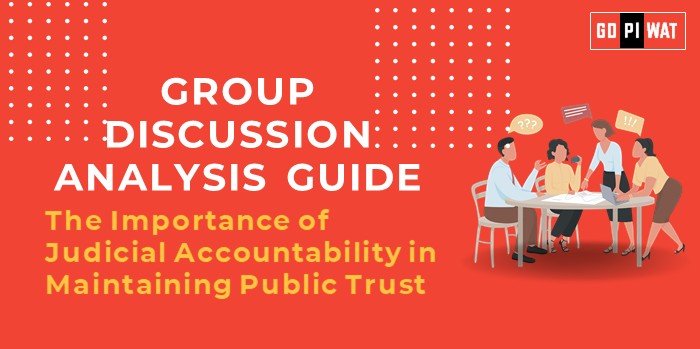📋 Group Discussion (GD) Analysis Guide: The Importance of Judicial Accountability in Maintaining Public Trust
🌐 Introduction to Judicial Accountability
Opening Context: Judicial accountability is the cornerstone of democracy, ensuring that the judiciary, as a guardian of constitutional rights, functions transparently and responsibly. Recent debates about judicial ethics and reforms have highlighted the need for maintaining public trust.
Topic Background: The principle of judicial accountability balances judicial independence and responsibility. Globally, countries like the USA and UK have established mechanisms, but India’s judiciary, with its vast docket and pivotal role, faces unique challenges.
📊 Quick Facts and Key Statistics
- 📁 Pending Cases in India: Over 40 million cases pending (National Judicial Data Grid, 2024) – Highlights the judiciary’s burden.
- 🏛️ Judicial Vacancies: 30%+ unfilled positions in subordinate courts (Law Ministry, 2024) – Indicates systemic inefficiencies.
- 🌍 Global Comparison: India ranks 69th in the World Justice Project’s Rule of Law Index, 2023 – Reflects challenges in access to justice.
- 💵 Judicial Expenditure: Less than 1% of GDP allocated to the judiciary – Highlights underfunding issues.
🔍 Stakeholders and Their Roles
- ⚖️ Judiciary: Upholds constitutional values, interprets laws, and ensures justice delivery.
- 🏢 Government: Allocates resources and frames policies for judicial efficiency.
- 👩⚖️ Bar Associations: Advocate for judicial reforms and ensure ethical practices.
- 👥 Citizens: Demand transparency, quick resolutions, and fair judgments.
- 📰 Media: Acts as a watchdog, highlighting judicial shortcomings and successes.
🏆 Achievements and Challenges
Achievements:
- 📜 Landmark judgments enhancing constitutional values (e.g., decriminalization of Section 377).
- 💻 Technological advances, such as e-courts and virtual hearings during COVID-19.
- 📢 Public Interest Litigations (PILs) empowering marginalized voices.
Challenges:
- 🔍 Transparency: Lack of clarity in judicial appointments and decision-making.
- ⏳ Delays: Cases pending for decades, leading to justice denied.
- ⚠️ Corruption Allegations: Threatening public trust in the judiciary.
Global Comparisons:
- 🇺🇸 USA: Transparent judicial appointments through Senate hearings.
- 🇸🇬 Singapore: High efficiency due to strong judicial infrastructure.
Case Studies:
- 📜 Ayodhya Verdict: Balanced communal sensitivities but highlighted lengthy delays.
- 🔐 AIIMS Cybersecurity Case: Exposed vulnerabilities in judicial IT systems.
🎯 Structured Arguments for Discussion
- ✅ Supporting Stance: “Judicial accountability enhances trust, which is essential for democracy’s survival.”
- ⚖️ Opposing Stance: “Excessive accountability measures can undermine judicial independence.”
- 🤝 Balanced Perspective: “While judicial accountability is vital, it must be implemented without compromising autonomy.”
🗣️ Effective Discussion Approaches
Opening Approaches:
- 💬 “Public trust in the judiciary is foundational for the rule of law.”
- 💬 “Judicial reforms, including accountability mechanisms, are overdue.”
Counter-Argument Handling:
- 🔄 Example: “Addressing concerns about independence, transparency in appointments can build both trust and autonomy.”
🔍 Strategic Analysis of Strengths and Weaknesses
- 💪 Strengths:
- Constitutional safeguards for independence.
- Progressive judgments.
- 🔧 Weaknesses:
- Systemic delays and resource constraints.
- 🌟 Opportunities:
- Technological interventions for efficiency.
- Collaboration with international best practices.
- ⚠️ Threats:
- Corruption allegations.
- Erosion of public trust.
💼 Connecting with B-School Applications
Real-World Applications: Examining judicial accountability can inspire projects on governance or corporate ethics.
Sample Interview Questions:
- 💡 “How does judicial accountability impact economic policies?”
- 💡 “What reforms are essential for ensuring a robust judiciary?”
Insights for Students: Consider the judiciary’s role in regulatory frameworks for businesses and its implications for governance models.


